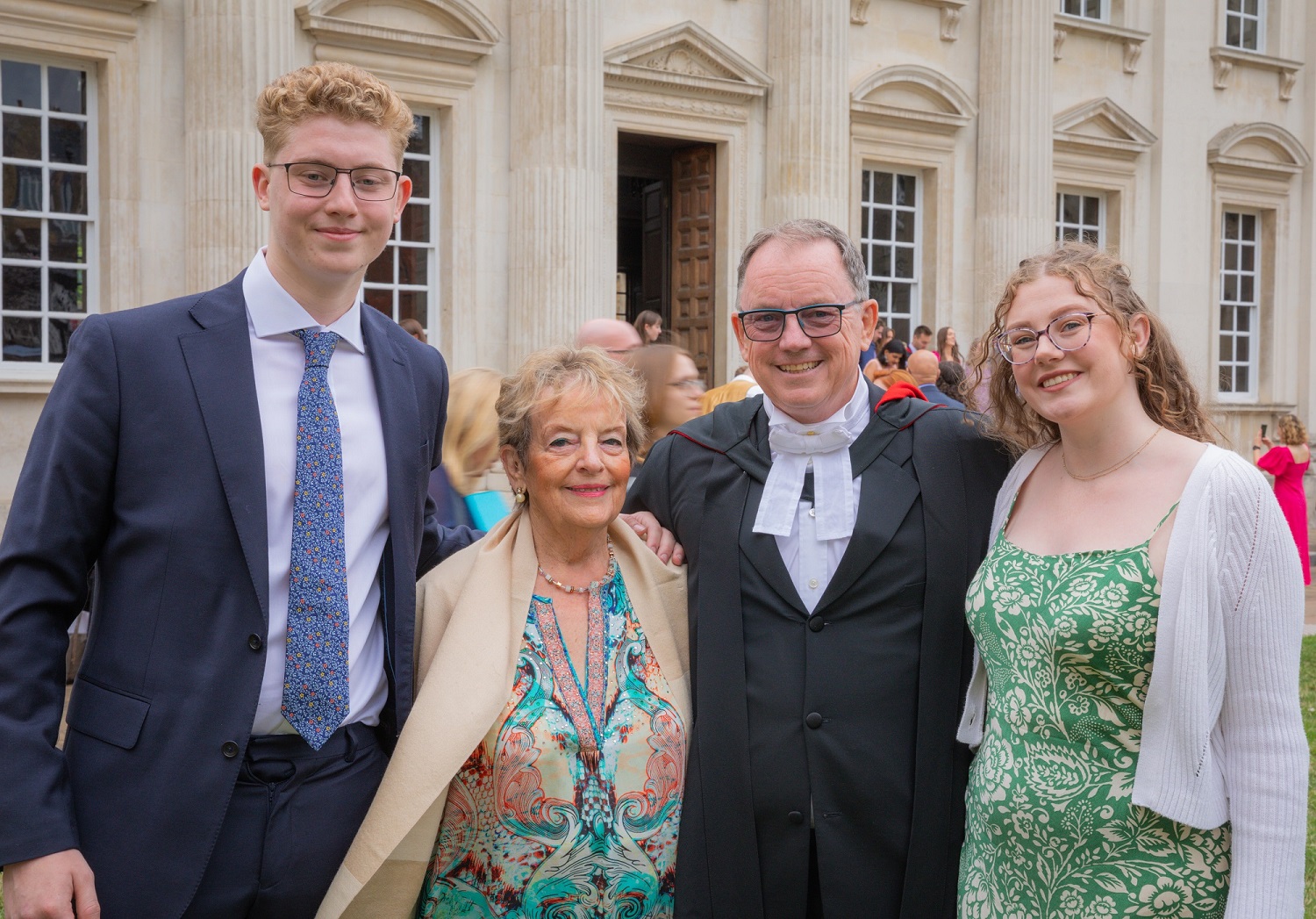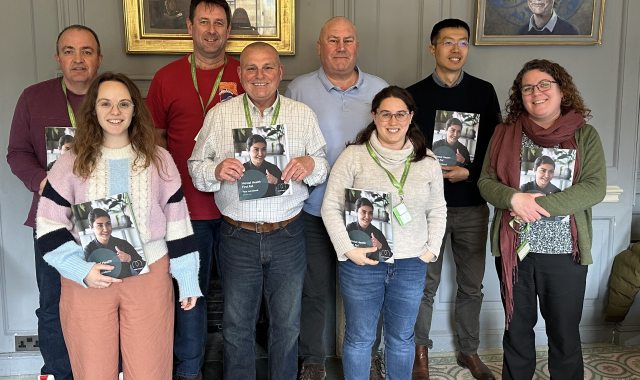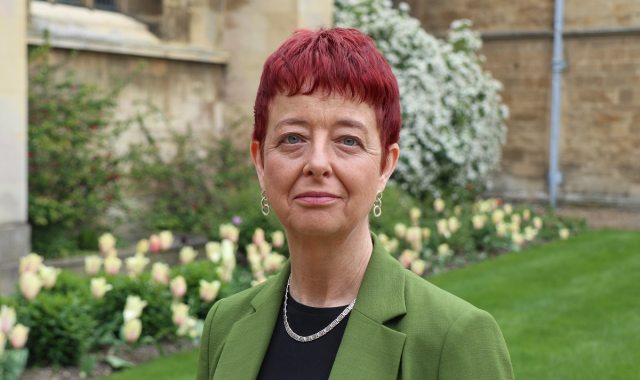The end of a long-awaited journey
- 24 July 2023
- 9 minutes
Queen guitarist Brian May spent more than four decades completing his PhD. Alex Duncan (Molecular Biology PhD 1984) completed his in 37 months, but has waited 36 years to graduate from the University of Cambridge.
May began his PhD in 1971 and it was awarded in 2007, five years after his solo from the roof of Buckingham Palace as part of the celebrations of the Golden Jubilee of Queen Elizabeth II.
Alex began his PhD in October 1984 and completed it before the end of 1987, under the supervision of Dr Gregory Winter (later Sir). Alex was in a hurry to get on and left for a post-doctoral position before congregation came round and then became too busy with his career in biotechnology and pharmaceuticals, and as a father of four, to collect his degree certificate, much to the frustration of his proud mother, Frances.
It has been problematic at times, not least when changing jobs, and on Friday 21 July Alex finally walked through the Gate of Honour at Gonville & Caius College to receive his degree from the University of Cambridge at Senate House.
Alex was accompanied by two of his children, his daughter Lily and son Henry, and by his mum, Frances, now aged 84, all pictured below.
“I've never called myself doctor. I've always been Mr Duncan PhD,” he says.
“I had met all of the requirements. When I when I have gone to a job and they have had to do a background check, I produce a certificate that says ‘degree not awarded’. And I have to explain that it just means I didn't collect it myself. They then often contact the University to confirm that I have actually got a PhD, but congregation had to wait.”
Graduating in absentia would have resolved the administrative issues when changing jobs, but Alex opted not to do so.
“I just remember my mum. She was so keen to come here for the graduation ceremony,” he says.
“Most of the time I was just too busy.”
Alex reflects on his career to date, which included post-doctoral research at the University of California, San Diego, and working with, among others, Cambridge Antibody Technology (CAT), AstraZeneca, Actigen, Agenus and Walden Biosciences, where he is currently chief scientific officer.
“I love what I'm doing,” says Alex, who completed his undergraduate degree at King’s College, London.
“I think I've made a contribution. I've been involved in over 50 drug discovery programmes that have gone through at least phase one trials and quite a few of those now have made it on to market.
“Most people in the pharma industry never work on a successful project so I feel privileged and lucky. And it's been a great experience, I've learned a lot and I'm trying to hang on to that.”
Photo credits: Lloyd Mann, University of Cambridge
--
After completing his undergraduate degree, Alex wrote to Professor Sir Alan Fersht, who was then at Imperial College, London and was subsequently Master of Caius, and Dr Terry Rabbitts. Both referred him to Dr Winter at the Laboratory of Molecular Biology at Cambridge.
Alex was seeking to build on his interest in site directed mutagenesis – the use of point mutations to understand the structure/function relationships of antibodies and their binding partners – and admired the collaboration of Dr Winter and Professor Fersht on tRNA synthetase, a protein which is involved in the fidelity of protein coding.
The day-long interview challenged Alex, who afterwards enjoyed strolling around Cambridge with his mother and decided upon Caius as his college, if he was successful.
“I met all these really great people at the LMB but I thought I'd really messed up the interview,” he says.
“I didn't have a strong grounding in molecular biology. I saw Greg several times and he would ask me questions and then later on he would ask me similar questions and I couldn’t remember the answer from the first time!”
The offer of a PhD studentship followed, but only after the intervention of Dr César Milstein, who appealed to the Medical Research Council for an additional studentship, the previous allocation of three having already been distributed for the forthcoming year.
Alex had impressed Dr Winter and Dr Milstein in his application.
“I had written a letter which had similarities to the research plan that Greg and César had put together,” Alex says.
They were impressed and pleased that (a) he had a plan, and (b) it had some similarities to a line of work that they had been considering.
He did disappoint Dr Winter and Dr Milstein on one thing, though. His choice of college. Cesar Milstein was a Fellow of Darwin, and Greg had suggested Trinity.
“We thought Caius was the prettiest college, but also very tranquil, and a good place to study,” Alex says. “So I applied to Caius.”
--
Video courtesy of the University of Cambridge
Alex soon became immersed in life at the LMB. Two weeks into his PhD he found himself sitting between Dr Milstein and Dr Sydney Brenner, then the head of the LMB, listening to an academic talk when a staff member came in and whispered to Dr Brenner.
“Sydney stood up and he said ‘I'm sorry, speaker, I have to stop you. We've just been notified that César Milstein has won this year's Nobel Prize in Physiology or Medicine’,” Alex says.
“And then he leaned across me to shake César’s hand. And I just thought ‘I don't know what I'm doing here’. It was real impostor syndrome.”
At the end of his first year, instead of submitting a report which many dedicate three months to writing to support their PhD progression – “I was just starting to generate some really interesting results and I was in a hurry,” Alex says – he asked if he could present his work in a seminar. Dr Winter sought approval and the University agreed.
As he stood at the front addressing the room ahead of his 30-minute talk, he wondered if he had miscalculated.
Alex adds: “Giving a talk at the LMB is the most frightening talk you will ever give. Everybody knows a lot about the subjects you're talking about.
“And I'd seen full professor-level individuals quite nervous about having to get up in front of their peers.
“I got up to give my talk and then in the front row was Fred Sanger, who had won two Nobel Prizes, Max Perutz, Aaron Klug, César… multiple Nobel Prizes in the front row alone.”
The talk went well, as did his responses to the questions which followed.
“I knew my stuff, I just thought people would know more than me,” Alex adds.
“Aaron always asked the first question. He was intrigued by everything.
“César asked the next question. And when he did, I realised that actually I did know more about this than he did, and that was transformative for me.
“I suddenly realised, actually, maybe I did belong here and maybe I could make a contribution and it was basically a springboard then to really go for it.”
He is grateful to Dr Winter, who won the Nobel Prize in Chemistry in 2018.
“He took care of the people in his lab in a way I hadn't really seen with a lot of the other supervisors who tended to leave people alone or talk to them once a week,” Alex adds.
“He talked to me every day. We discussed results, what we could learn about it. He was very driven and was a really fantastic supervisor.”
Alex had published two Nature papers by the time he had submitted his PhD, written in three months.
His friends and colleagues assumed the defence of his thesis would be a formality.
Professor Dennis Burton, then at Sheffield and now Professor and Chair of Immunology and Microbiology at the Scripps Research Institute in California, was Alex’s external examiner, with Dr Milstein his internal examiner. The usual form is for the external examiner to lead the questioning in the viva, with the internal examiner to support the PhD candidate or guide them in moments of difficulty.
“We started off and Dennis said he really liked the introduction, how I'd set everything up,” Alex says.
“And then César just went straight in with laser-like focus, into questioning to the point where Dennis was quite surprised.
“César said ‘you talk about complement fixation, a biological process which has a threshold of activation. Do you think you could write a mathematical formula to describe what happens in people? And maybe we should just do this together, right now?’
“Dennis was getting very concerned about the defence of my thesis!”
Time ticked on, way beyond the expected end.
“The champagne has been on ice for hours and everyone was starting to get quite worried,” Alex says.
“Actually the reality was we were just having this really intense scientific discussion and nobody realised where the time went. That was quite common with César. He was somebody you could talk to and literally a whole afternoon could go by.
“I was really enjoying. It was great to be in that focused discussion with a Nobel Laureate.”
Next Alex moved to California, days before his scheduled congregation.
--
It took time for Alex to adjust to the Californian academic lifestyle, but he soon embraced it, enjoying five years there.
He returned to Cambridge with CAT, a company co-founded by Dr Winter and which was acquired by AstraZeneca in 2006.
After leaving AstraZeneca, he travelled to San Francisco for a biotechnology conference. Unable to pay for the delegate fee himself, he instead stationed himself at an outside table of a coffee shop, engaging delegates in conversation.
“I stayed with a friend and I sat outside Starbucks in Union Square in San Francisco and I talked to loads of people who were walking past,” he says.
“One night I woke up at about 3am and I got a notebook and I just I just had all these ideas tumbling out of my head. So I scribbled 30 pages of notes.”
Alex’s friend was a patent lawyer, and the next day they worked together on deciphering the scribbles into layman’s terms.
He says: “We took those notes went out and raised a seed fund of just under $1million. We wrote six patents and we went out to raise a Series A the same week Lehman Brothers went bust. We actually did put a syndicate together, but before anything was done, the financial crash had happened.”
An early consultation led to a one permanent role, before a subsequent move to Boston, Massachusetts which had become the centre of gravity for biotechnology.
During this time Dr Winter became Master of Trinity, (2012-2019) and Professor Fersht Master of Caius (2012-2018).
Alex says: “I remember waking from a nightmare recreation of a scene from Chariots of Fire where the Master of Caius and the Master of Trinity are looking down on the great quad, though instead of the actors Sir John Guilgud and Lindsay Anderson there was Greg and Alan looking down on us mere mortal scientists running around the quad!”
The Covid-19 pandemic presented a significant obstacle, coming weeks after Alex had joined Walden Biosciences and closed a $51m Series A seed fund.
“There was me and two chemists inside in this room, looking at each other: what do we do now?” he says.
They worked within the constraints of pandemic restrictions – with Alex back home in Girton, Cambridge – and the company grew.
Alex continues to divide his time between Cambridge, Massachusetts and Cambridge, UK, where he has finally closed the chapter on his academic career to become Dr Duncan. Congratulations, Alex!



